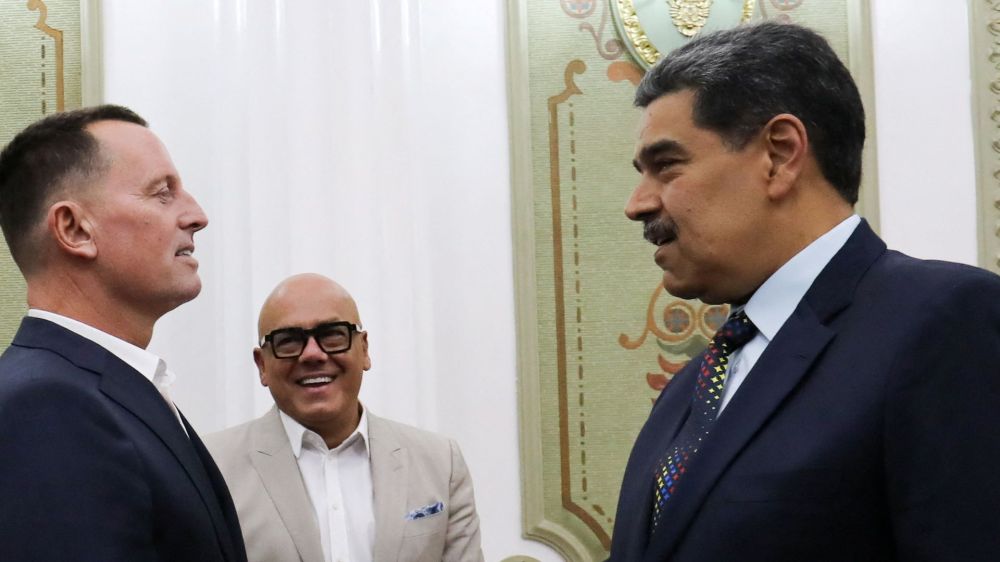 Reuters
Reuters
Venezuela frees 6 Americans after meeting with Trump’s diplomatic envoy
By Alex Delia (Deputy Managing Editor), Devin Pavlou (Digital Producer)
Venezuela released six detained Americans on Friday, Jan. 31, following a high-level meeting between President Nicolás Maduro and Richard Grenell, an envoy for President Donald Trump. The release comes amid renewed tensions over U.S. deportation policies and ongoing disputes regarding Maduro’s legitimacy as Venezuela’s leader.
Media Landscape
See how news outlets across the political spectrum are covering this story. Learn moreBias Distribution
Untracked Bias
Grenell Meets With Maduro in Caracas

Grenell, who served as Trump’s acting director of national intelligence, traveled to Caracas for a short diplomatic visit focused on securing the Americans’ release and urging Venezuela to accept deported criminals, particularly members of the notorious Tren de Aragua gang.
The six freed detainees, whose identities have not been disclosed, were seen in light-blue Venezuelan prison uniforms as they boarded a U.S.-bound plane with Grenell.
“They just spoke to @realDonaldTrump and they couldn’t stop thanking him,” Grenell posted on X, sharing a photo of the smiling former prisoners on the flight home.
Trump celebrates the Americans’ return
Trump also praised Grenell’s efforts on social media, calling it a “great job” by his envoy and administration.
“Just been informed that we are bringing six hostages home from Venezuela. Thank you to Ric Grenell and my entire staff. Great job,” Trump posted.
More Americans still detained in Venezuela
At least 10 other U.S. citizens remain imprisoned in Venezuela, including a former Navy SEAL and three Americans accused by the Maduro regime of plotting against the government.
The exact charges against the six released Americans remain unclear, but U.S. officials maintain that their release was not part of a diplomatic trade or negotiation.
U.S. officials: “No quid pro quo“
Mauricio Claver-Carone, the U.S. special envoy on Latin America, emphasized that the hostages’ release was not the result of a political exchange.
“The release of American hostages needs to be immediate and unequivocal,” Claver-Carone said. “This is not a quid pro quo. It’s not a negotiation in exchange for anything. Trump himself has made that very clear.”
U.S. pressures Venezuela to accept deported criminals
In addition to securing the detainees’ release, Grenell’s visit also addressed U.S. efforts to deport hundreds of Venezuelan criminals back to their home country.
The Trump administration has demanded that Venezuela accept the return of Tren de Aragua gang members, but Maduro’s government has resisted taking them back.
“This is non-negotiable,” Claver-Carone stated.
Policy shift: U.S. revokes protected status for Venezuelan migrants
The release of the six Americans comes just days after Homeland Security Secretary Kristi Noem announced that the Trump administration revoked Temporary Protected Status (TPS) for more than 600,000 Venezuelan migrants in the U.S.
The decision marks a major shift in immigration policy and is expected to further strain relations between Washington and Caracas.
Maduro’s controversial third term
Maduro, who was sworn in for a third six-year term earlier this year, remains unrecognized by the U.S. government. Instead, the U.S. recognizes opposition leader Edmundo González as the legitimate president, claiming he won Venezuela’s most recent election by a two-to-one margin.
Media Landscape
See how news outlets across the political spectrum are covering this story. Learn moreBias Distribution
Untracked Bias
Straight to your inbox.
By entering your email, you agree to the Terms & Conditions and acknowledge the Privacy Policy.
MOST POPULAR
-
 Getty Images
Getty Images
DHS Secretary Noem tells wildfire victims to protect themselves and property
Watch 1:527 hrs ago -
 Getty Images
Getty Images
Former Social Security head claims DOGE will cause payment interruptions
Read8 hrs ago -
 Getty Images
Getty Images
Gen Z's approval rating constantly fluctuating
Watch 3:418 hrs ago -
 Getty Images
Getty Images
Trump to put tariffs on agricultural imports, tells farmers to ‘have fun’
Watch 2:0712 hrs ago




